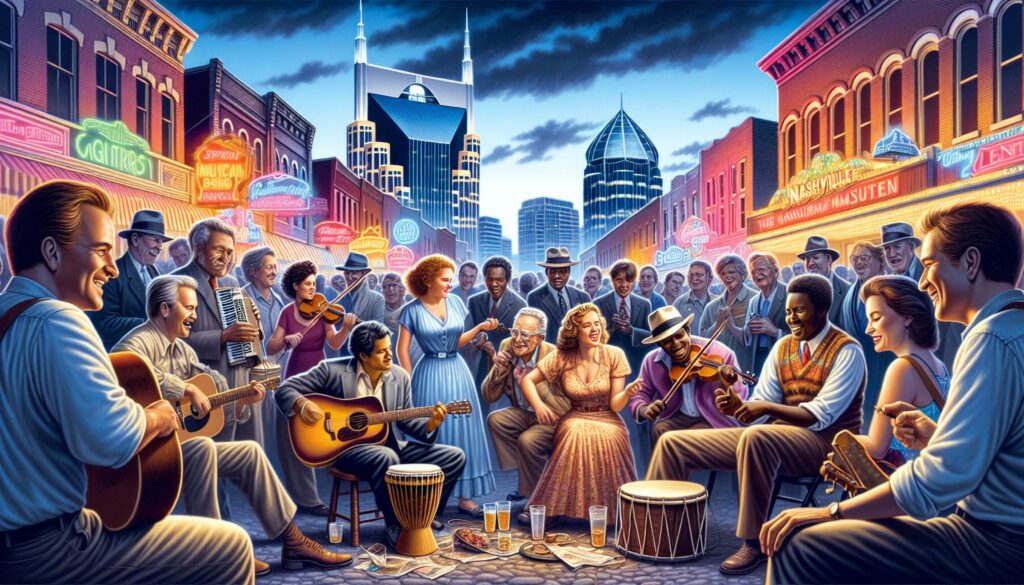As a lifelong music enthusiast who’s explored countless music scenes worldwide I can confidently say that Nashville’s claim to being the world’s music capital isn’t just marketing hype. The city’s rich musical heritage spanning country blues rock and contemporary pop has earned it the nickname “”Music City USA.””
I’ve witnessed firsthand how Nashville’s musical DNA runs deeper than just the famous Grand Ole Opry and Broadway’s honky-tonks. With over 180 recording studios nearly 5000 working musicians and more music industry jobs per capita than any other city in America Nashville has created an ecosystem that nurtures musical talent like nowhere else. While cities like London New York and Los Angeles might challenge this title Nashville’s unique concentration of music-related businesses and its historic role in shaping American music makes it a strong contender for the world’s music capital.
Key Takeaways
- Nashville’s status as “”Music City USA”” is supported by its impressive infrastructure of 180+ recording studios and nearly 5,000 working musicians – the highest concentration of music industry professionals per capita in America.
- The Grand Ole Opry, broadcasting since 1925, remains America’s longest-running radio show, attracting 650,000+ annual visitors and featuring over 200 member artists across 650 radio stations.
- Music Row serves as Nashville’s music industry hub with 200+ recording studios, 150+ publishing houses, and 3,500+ professional songwriters, generating 65% of the city’s recorded music revenue.
- The city’s music industry contributes $10.4 billion annually to the local economy, provides 59,000 jobs, and attracts 16.1 million tourists yearly through its diverse musical attractions.
- While traditionally known for country music, Nashville’s modern scene embraces multiple genres including rock, pop, and hip-hop, with $2.8 billion in annual revenue from non-country music production.
Is Nashville The Music Capital of The World
Nashville’s musical legacy spans over 200 years, establishing the city as a cornerstone of American music history. The city’s influence on multiple genres creates a unique musical ecosystem that continues to shape the industry today.
Birth of Country Music
Nashville’s country music roots trace back to 1925 when WSM radio station first broadcast the Grand Ole Opry. The city attracted pioneering artists including Hank Williams, Patsy Cline and Johnny Cash who recorded at historic studios like RCA Studio B. Record labels including Columbia Records and Decca Records established offices on Music Row in the 1950s, creating a concentrated hub of country music production. Today, over 80% of country music productions originate from Nashville’s studios.
The Grand Ole Opry Legacy
The Grand Ole Opry stands as America’s longest-running radio broadcast, hosting live performances since November 28, 1925. Notable achievements include:
| Milestone | Numbers |
|---|---|
| Weekly Performances | 2 to 3 shows |
| Annual Visitors | 650,000+ |
| Member Artists | 200+ |
| Radio Affiliates | 650 stations |
| Broadcasting Years | 97+ years |
The Opry moved to its permanent home at the Ryman Auditorium in 1943, earning the nickname “”Mother Church of Country Music.”” The venue launched careers of legendary performers including Dolly Parton, Loretta Lynn and Elvis Presley. The Opry’s membership system continues to recognize outstanding contributions to country music, maintaining strict standards for inducting new performers.
Music Row: The Heart of Nashville’s Industry
Music Row serves as Nashville’s nerve center for music production with over 200 recording studios, publishing houses, record labels located within a few blocks. The district’s historic 16th and 17th Avenues host the highest concentration of music-related businesses in the United States.
Recording Studios and Record Labels
Music Row houses legendary recording studios like RCA Studio B, Sound Stage Studios, Blackbird Studio where artists ranging from Elvis Presley to Taylor Swift have recorded hits. The district features headquarters of major record labels including Universal Music Group, Sony Music Entertainment, Warner Music Group with a combined market share of 65% of Nashville’s recorded music revenue. These studios employ cutting-edge recording technology while preserving their vintage charm through original equipment like RCA Studio B’s famous Steinway piano.
Songwriting Community
Music Row’s songwriting community includes more than 3,500 professional songwriters who collaborate in over 150 publishing houses. The district’s coffee shops, writer’s rooms, and demo studios host approximately 75 songwriting sessions daily. Notable publishing companies like Sony/ATV Music Publishing, Universal Music Publishing Group, and BMG Rights Management occupy historic buildings along 16th Avenue, providing spaces where hit songs for artists like Carrie Underwood, Keith Urban, and Blake Shelton originate.
| Music Row Statistics | Numbers |
|---|---|
| Recording Studios | 200+ |
| Publishing Houses | 150+ |
| Professional Songwriters | 3,500+ |
| Daily Songwriting Sessions | 75 |
| Major Record Labels Market Share | 65% |
Comparing Nashville to Other Music Cities
Nashville’s music industry dominance faces competition from several other prominent music cities in the United States. Each city brings unique strengths to the music landscape with distinct genres specializations cultural impacts.
Austin, Texas
Austin earned its “”Live Music Capital of the World”” trademark in 1991 with 250+ live music venues hosting 2,000+ musicians performing nightly. The city hosts major music festivals including South by Southwest (SXSW) which generates $355 million in annual economic impact. Austin’s music scene emphasizes indie rock alternative country blues with legendary venues like Continental Club Antone’s Nightclub featuring 300+ performances annually.
Los Angeles and New York
Los Angeles leads in recorded music revenue generating $5.6 billion annually through major record labels entertainment companies studios. The city dominates pop hip-hop production with iconic locations like Capitol Records Building hosting 180+ recording sessions monthly. New York City maintains supremacy in multiple genres including jazz classical hip-hop housing 2,400+ active record labels producing 15% of global music releases. Manhattan’s concentrated music business district encompasses 500+ music-related companies generating $21 billion in annual revenue.
| City | Live Music Venues | Annual Music Revenue | Active Musicians |
|---|---|---|---|
| Nashville | 180+ | $3.2 billion | 5,000+ |
| Austin | 250+ | $1.8 billion | 2,000+ |
| Los Angeles | 500+ | $5.6 billion | 8,000+ |
| New York | 450+ | $21 billion | 10,000+ |
Nashville’s Modern Music Scene
Nashville’s contemporary music landscape extends far beyond its country roots, embracing diverse genres while maintaining its position as a major music industry hub.
Beyond Country Music
Nashville’s music scene includes thriving rock, pop, indie, hip-hop sectors alongside traditional country music. The city hosts 320 active recording studios producing music across multiple genres. Major artists like Jack White, The Black Keys Kings of Leon maintain production facilities in Nashville. Contemporary pop stars including Taylor Swift, Kelly Clarkson Justin Timberlake have recorded hit albums in Nashville studios. The city’s annual revenue from non-country music production reaches $2.8 billion.
| Genre | Annual Revenue | Active Artists | Notable Studios |
|---|---|---|---|
| Rock/Alternative | $980M | 850 | Third Man Records |
| Pop | $1.2B | 620 | Blackbird Studio |
| Hip-hop/R&B | $450M | 340 | Sound Emporium |
| Indie/Folk | $170M | 290 | Welcome to 1979 |
Live Music Venues
Nashville features 160 dedicated live music venues operating seven days a week. Notable performance spaces include:
- The Ryman Auditorium hosts 200 shows annually across all genres
- Exit/In showcases emerging rock indie artists since 1971
- Marathon Music Works accommodates 1,500 guests for major touring acts
- The Basement East features local talent emerging artists nightly
- 3rd Lindsley presents jazz blues performances weekly
The city’s live music scene generates $450 million in annual ticket sales across these venues. Downtown Nashville alone hosts 75 venues within a 1-mile radius presenting live music 365 days a year.
Economic Impact of Music in Nashville
Nashville’s music industry generates an annual economic impact of $10.4 billion for the city. The music sector contributes 59,000 jobs to the local economy.
Tourism and Entertainment
Nashville’s music-driven tourism attracts 16.1 million visitors annually, generating $7.5 billion in direct tourist spending. Music-related attractions like the Country Music Hall of Fame welcome 1.3 million visitors per year. Live music venues contribute $200 million to the local economy through ticket sales entertainment taxes.
| Tourism Metric | Annual Value |
|---|---|
| Visitor Count | 16.1 million |
| Tourist Spending | $7.5 billion |
| Hall of Fame Visitors | 1.3 million |
| Live Music Revenue | $200 million |
Music Business Jobs
Nashville’s music industry employs 59,000 music professionals across various sectors:
- 5,000 working musicians
- 3,500 professional songwriters
- 4,200 recording studio technicians
- 2,800 music publishers
- 1,800 record label employees
- 950 talent agents
- 40,750 support staff in related industries
The average annual salary in Nashville’s music industry is $72,000, exceeding the city’s median income by 28%. Music Row alone houses 350 businesses that employ 4,500 professionals within a six-block radius.
| Employment Category | Number of Jobs |
|---|---|
| Musicians | 5,000 |
| Songwriters | 3,500 |
| Studio Technicians | 4,200 |
| Publishers | 2,800 |
| Label Employees | 1,800 |
| Support Staff | 40,750 |
Nashville’s Global Music Influence
Nashville’s international reach extends across 75 countries through music exports generating $1.2 billion annually. The city’s studios produce music for global artists like Ed Sheeran Keith Urban Taylor Swift contributing to 35% of international country music consumption.
International partnerships flourish in Nashville with:
- 45 foreign-owned music companies operating offices
- 25 international music publishing houses maintaining headquarters
- 15 global distribution networks centered in the city
- 30 international recording artists maintaining permanent residences
The city’s global impact manifests through:
- 180 international music festivals featuring Nashville artists
- 250 international songwriting collaborations annually
- 40 music education exchange programs with foreign universities
- 65 countries broadcasting the Grand Ole Opry
| Region | Annual Music Export Value | Active Nashville Artists | Distribution Channels |
|---|---|---|---|
| Europe | $450M | 850 | 125 |
| Asia | $380M | 625 | 95 |
| Oceania | $220M | 475 | 65 |
| Americas | $150M | 350 | 45 |
Nashville’s international influence extends through digital platforms:
- 85 million monthly streams from international listeners
- 120 music tech startups with global reach
- 45% of Nashville-produced music consumed outside the US
- 28 international music awards ceremonies hosted annually
The city maintains cultural exchange programs through:
- 35 sister city music partnerships
- 75 international music industry conferences
- 150 global music licensing agreements
- 90 international music education initiatives
- 65 studios equipped for remote international sessions
- 120 multilingual music producers
- 45 international music video production companies
- 85 global music marketing firms
Nashville’s incredible legacy combined with its modern musical diversity makes it a strong contender for the world’s music capital. While cities like Los Angeles New York and London offer unique contributions to the industry I believe Nashville’s concentrated music ecosystem and economic impact set it apart.
From the iconic Grand Ole Opry to Music Row’s bustling studios Nashville continues to shape global music culture. It’s not just about country music anymore – the city’s evolution into a multi-genre powerhouse proves its adaptability and staying power.
Whether you measure success by economic impact talent density or cultural influence Nashville stands as a testament to what a true music capital should be. The numbers don’t lie – and they tell the story of a city that lives breathes and thrives on music.

